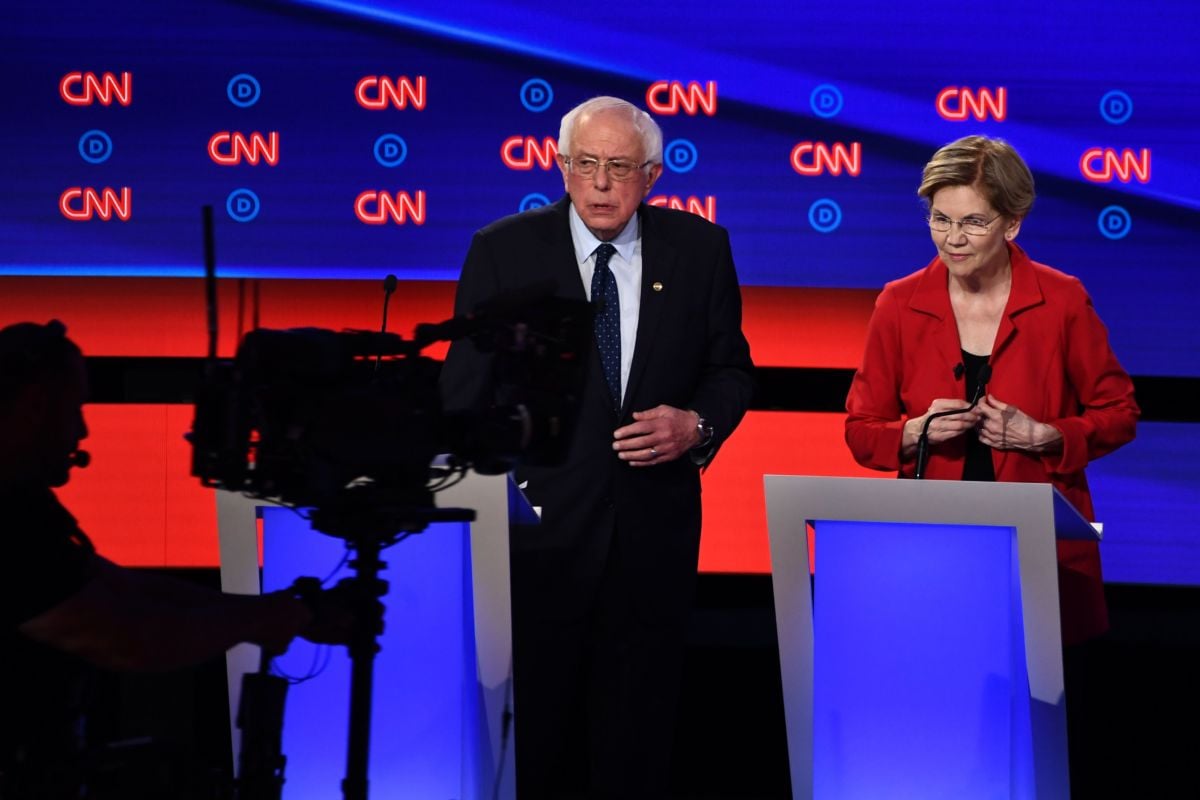In every single Democratic debate this year, the same ridiculous question has been posed to at least one of the candidates supporting Medicare for All: “Will you raise middle class taxes to pay for it?”
Most recently, the question was aimed at Sen. Elizabeth Warren, by ABC News moderator George Stephanopoulos. She explained, much more politely than I would have, that Medicare for All would save the vast majority of American families’ money, while asking for a bit more from corporations and the wealthiest Americans, to create an efficient and universal health care system.
Stephanopoulos didn’t accept that answer, continually pressing on about whether Medicare for All would mean middle-class tax hikes. After having the exact same conversation for five debate nights in a row, it’s time someone explained to debate moderators why their question is a giant waste of everyone’s time.
I guess we’ll get one thing out of the way: Yes, taxes would likely go up to pay for Medicare for All, but that doesn’t matter.
Every reputable study on Medicare for All has shown it will save trillions of dollars over the next decade compared to the status quo. On the low end, the conservative think-tank the Mercatus Center found it would save about $2 trillion over that time, and the Political Economy Research Institute found about $5 trillion in savings over that time.
Under Medicare for All, premiums, deductibles and copays would all be covered by a universal government-funded system. While your doctors, hospitals and other medical providers would still operate independently, instead of billing your insurance company — or worse, charging you out of pocket — they would bill the new and expanded Medicare system.
This cuts out a greedy and inefficient middleman. While insurance companies don’t add anything of value to the system, they do take a lot of money from it. Getting rid of them means eliminating inflated executive salaries, large sales and marketing budgets, bloated claims departments and profits. It also means doctors, hospitals and providers can stop wasting resources on administration and paperwork, and spend more time focusing on the delivery of care.
Kicking that wasteful industry to the curb, combined with negotiating better drug prices, saves hundreds of billions a year.
The nice thing about spending less on health care is that we all get to spend less on health care.
Yes, middle-class families will likely have to pay slightly higher taxes, and businesses will have to pay slightly higher taxes, and then every other health care cost will disappear. We pay more than any other developed country on Earth for health care, but right now we are throwing our money into the bottomless pit of the for-profit health care system. Instead, we could be spending it on… health care.
Along with a moderate tax increase comes no more monthly premiums coming out of your check, no more copays at the doctor’s office, no more surprise medical bills, no more out-of-network providers, no more astronomical drug prices, no more out-of-pocket spending.
Better yet, no more GoFundMe campaigns to cover health care expenses, no more losing your health care if you lose your job, no more choosing between insulin and food, no more medical bankruptcies.
Even after taxes, families will be saving thousands of dollars and an incalculable amount of stress and worry.
Here are a few questions I am literally begging moderators to ask candidates about health care:
- Do you think that it is appropriate for employers to be able to keep children from accessing cancer treatments during labor negotiations?
- Do you think that leaving private insurance in place — with their profit motives, billing practices and claim denials — will be a more efficient system than single-payer?
- Do you believe that the $20,000 per worker that employers spend on a family health care plan could be better spent on things like higher wages, new jobs or keeping up with foreign competitors?
- Joe Biden: According to your campaign, your health care plan would ensure 97 percent of Americans are covered. What is your plan for the nearly 10 million people who would still be uninsured?
People in the U.S. want health care, and they don’t want to have to go broke to get it. I’m glad that debate moderators want to talk about Medicare for All, but it’s time to start asking the right questions.
Our most important fundraising appeal of the year
December is the most critical time of year for Truthout, because our nonprofit news is funded almost entirely by individual donations from readers like you. So before you navigate away, we ask that you take just a second to support Truthout with a tax-deductible donation.
This year is a little different. We are up against a far-reaching, wide-scale attack on press freedom coming from the Trump administration. 2025 was a year of frightening censorship, news industry corporate consolidation, and worsening financial conditions for progressive nonprofits across the board.
We can only resist Trump’s agenda by cultivating a strong base of support. The right-wing mediasphere is funded comfortably by billionaire owners and venture capitalist philanthropists. At Truthout, we have you.
We’ve set an ambitious target for our year-end campaign — a goal of $205,000 to keep up our fight against authoritarianism in 2026. Please take a meaningful action in this fight: make a one-time or monthly donation to Truthout before December 31. If you have the means, please dig deep.
